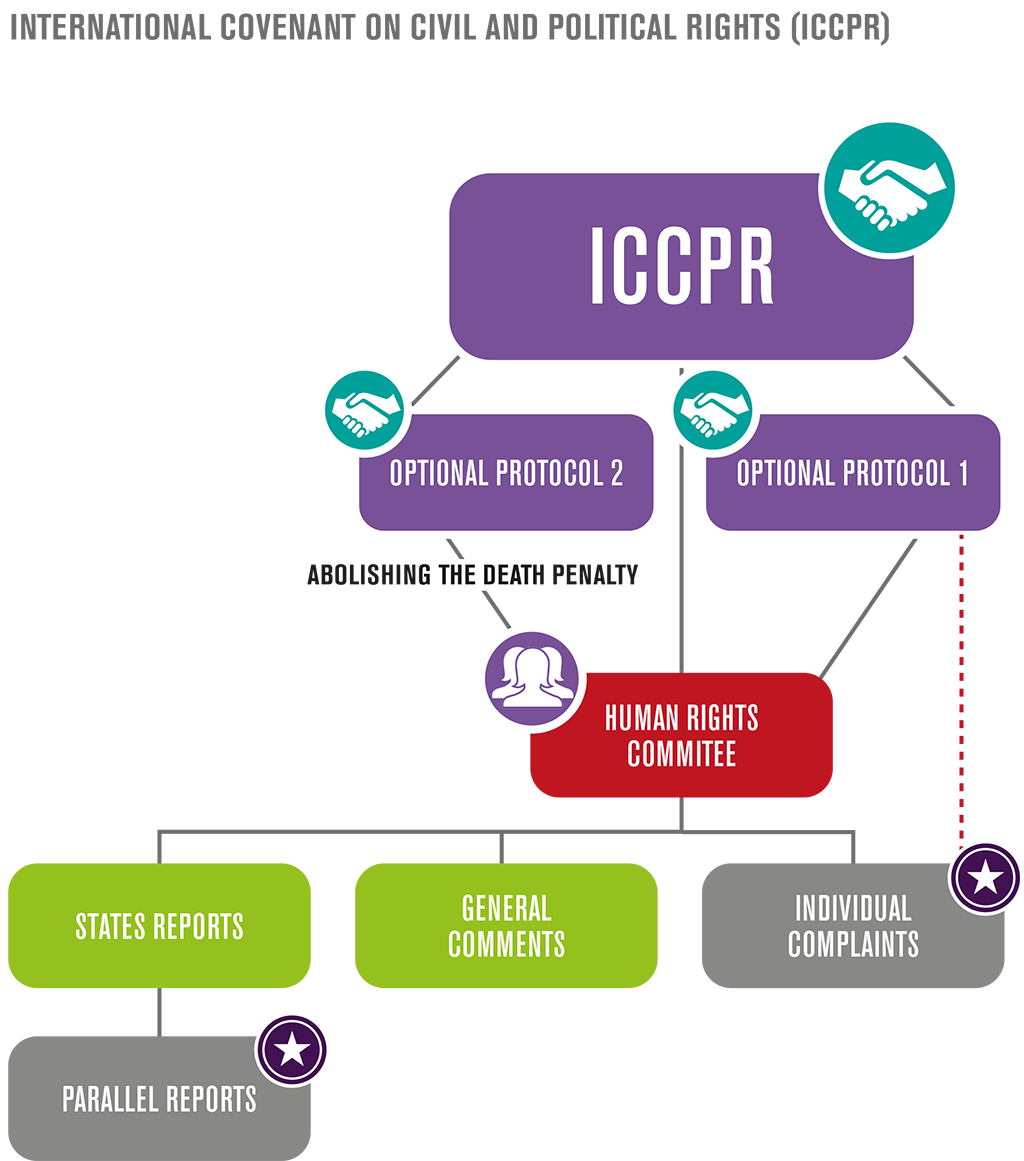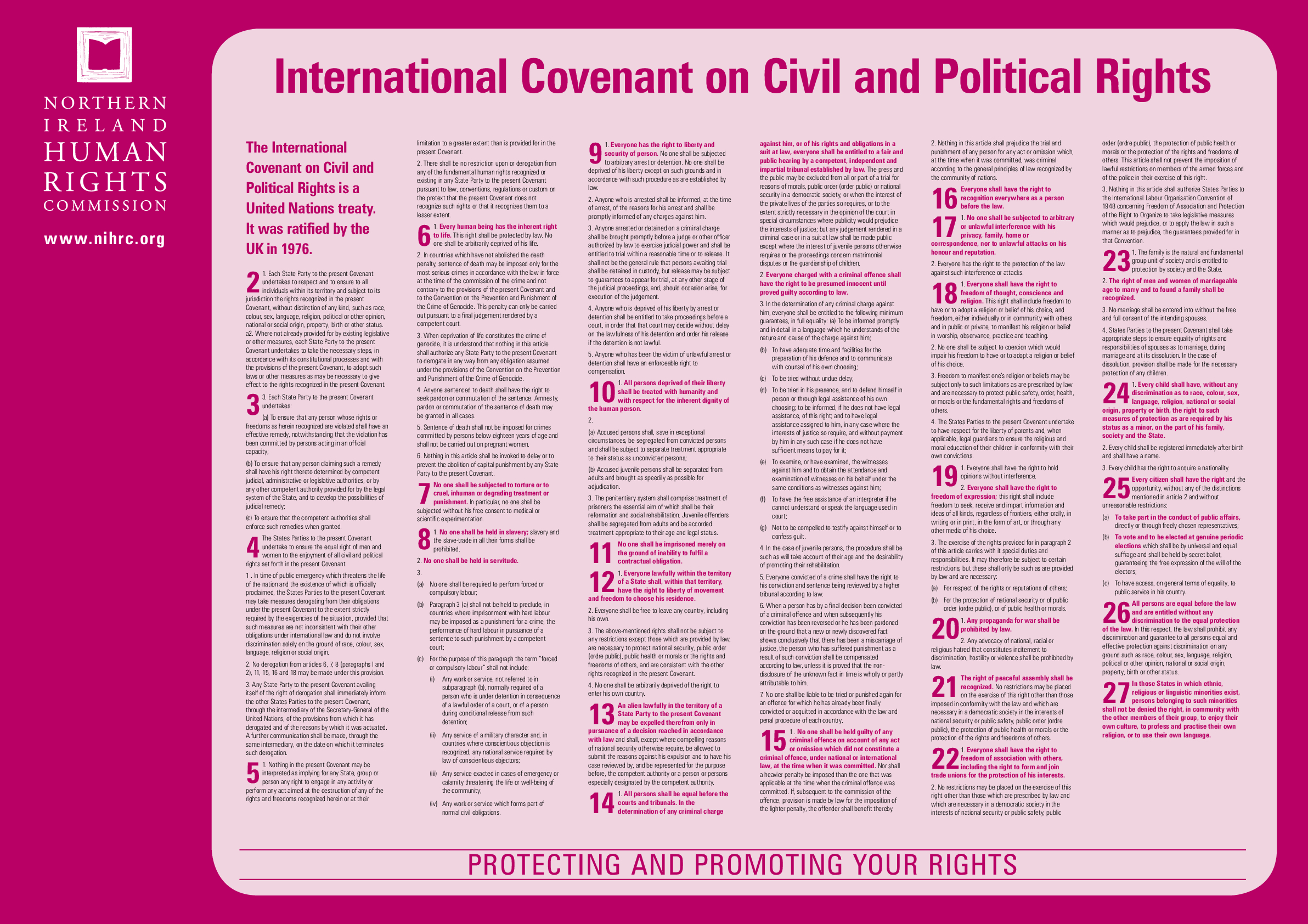The International Covenant on Civil and Political Rights is a multilateral treaty that commits nations to respecting various rights, including the right to life, freedom of religion, freedom of speech, freedom of assembly, and electoral rights. This treaty aims to protect the civil and political rights of individuals, ensuring their equality and fair treatment under the law.

Credit: blogs.lse.ac.uk
Key Provisions Of The Iccpr
Key Provisions of the International Covenant on Civil And Political Rights (ICCPR)
Freedom From Discrimination
The ICCPR emphasizes the principle of non-discrimination, stating that all individuals are entitled to equal protection under the law without any distinction. It prohibits discrimination on the grounds of race, color, sex, language, religion, political or other opinion, national or social origin, property, birth, or any other status.
Right To Equality
Under the ICCPR, every individual has the right to equality before the law and equal protection of the law. This includes equal rights for men and women, as well as protection against any form of discrimination.
Right To Life
The ICCPR recognizes the inherent right to life and establishes safeguards against arbitrary deprivation of life. It prohibits the imposition of the death penalty except for the most serious crimes.
Freedom Of Speech
Freedom of speech is a fundamental right protected by the ICCPR. Individuals have the right to express their opinions, ideas, and beliefs freely, without interference from the government or any other entity.
Freedom Of Assembly
The ICCPR guarantees the right to peaceful assembly, allowing individuals to gather and express their views collectively. It ensures that individuals can participate in public meetings, demonstrations, and other peaceful assemblies without fear of repression.
Electoral Rights
The ICCPR grants every citizen the right to participate in the conduct of public affairs, including the right to vote and to be elected at genuine periodic elections. It also guarantees the right to equal access to public service.
Rights To Due Process And A Fair Trial
The ICCPR safeguards the rights to due process and a fair trial for every individual accused of a crime. It ensures that individuals are treated equally before the law, with the right to be informed of the charges against them, to have legal representation, and to present evidence in their defense.
In conclusion, the International Covenant on Civil And Political Rights (ICCPR) contains key provisions that protect individuals from discrimination, ensure equality and the right to life, safeguard freedom of speech and assembly, guarantee electoral rights, and establish rights to due process and a fair trial. These provisions are crucial in promoting and protecting civil and political rights across nations.

Credit: nihrc.org
Comparison With The Universal Declaration Of Human Rights
The International Covenant on Civil and Political Rights is a multilateral treaty that aims to protect the civil and political rights of individuals, such as freedom of speech, religion, and assembly. It differs from the Universal Declaration of Human Rights by focusing specifically on these rights.
Differences Between Iccpr And Udhr
The International Covenant on Civil and Political Rights (ICCPR) and the Universal Declaration of Human Rights (UDHR) are two important international human rights documents that play a crucial role in protecting and promoting individual rights. While both aim to uphold human rights, there are several key differences between the ICCPR and UDHR.- The UDHR is a non-binding declaration adopted by the United Nations General Assembly in 1948, while the ICCPR is a legally binding treaty that was adopted by the General Assembly in 1966 and entered into force in 1976.
- The UDHR sets out a broad framework of human rights and is applicable to all people, regardless of their nationality or legal status. On the other hand, the ICCPR provides more specific protections for civil and political rights and is only applicable to states that have ratified the treaty.
- In terms of scope, the UDHR covers a wide range of rights, including economic, social, cultural, and political rights. The ICCPR, however, primarily focuses on civil and political rights, such as the right to life, freedom of expression, and the right to a fair trial.
- While both documents emphasize the importance of human rights, the ICCPR provides for more specific mechanisms to ensure the rights are upheld. It establishes a monitoring body known as the Human Rights Committee, which reviews state parties’ compliance with their obligations under the treaty.
Civil And Political Rights In The Udhr
The Universal Declaration of Human Rights (UDHR) serves as a guiding document for the promotion and protection of civil and political rights. It recognizes that every individual is entitled to certain fundamental rights, including:- Freedom of speech: This includes the right to express ideas and opinions without fear of censorship or reprisal.
- Right to a fair trial: It guarantees the right to a fair and impartial judicial process, including the presumption of innocence and the right to legal representation.
- Right to equality before the law: This principle ensures that all individuals are treated equally and without discrimination under the law.
- Freedom of assembly: It protects the right to gather peacefully and express views collectively.
- Right to participate in the political process: The UDHR recognizes the right of individuals to participate in the governance of their countries through free and fair elections.
Legal Status Of The Udhr
The Universal Declaration of Human Rights (UDHR) is not a legally binding treaty. However, it carries immense moral and political weight as a statement of shared values and principles. Though it does not directly create legal obligations for countries, it serves as an influential document that shapes international law and human rights norms. Despite its non-binding nature, the UDHR has been instrumental in inspiring the development of legally binding human rights instruments such as the International Covenant on Civil and Political Rights (ICCPR). The principles and rights enshrined in the UDHR have been incorporated into the legal frameworks of many nations and form the basis of international human rights law. In conclusion, while the ICCPR and UDHR share a common goal of protecting and promoting human rights, there are significant differences between the two. The ICCPR expands upon the rights outlined in the UDHR and provides specific mechanisms for monitoring compliance. However, both documents serve as important tools in the fight for human rights and are crucial in ensuring the dignity and well-being of individuals worldwide.Credit: journals.sagepub.com
Frequently Asked Questions For The International Covenant On Civil And Political Rights
What Is The Main Focus Of The Iccpr?
The main focus of the ICCPR is to ensure the protection of civil and political rights, including freedom from discrimination, right to equality, and right to life. It aims to safeguard the rights of individuals, such as freedom of speech, religion, assembly, and electoral rights.
What Is The Difference Between The Iccpr And The Udhr?
The ICCPR and the UDHR are both documents that protect human rights. The ICCPR focuses on civil and political rights such as freedom of speech and the right to a fair trial. The UDHR covers a wider range of human rights but doesn’t have the same legal binding as the ICCPR.
What Are The Civil And Political Rights Of The Udhr?
The civil and political rights of the UDHR include the right to life, freedom of religion, speech, and assembly, electoral rights, and the right to due process and a fair trial. These rights aim to protect individuals and ensure equality and justice.
Is The Udhr Legally Binding?
The Universal Declaration of Human Rights (UDHR) is not legally binding, but it serves as a guiding document for member countries to uphold fundamental human rights. While it does not create direct legal obligations, it has greatly influenced the development of international human rights law.
Conclusion
The International Covenant on Civil and Political Rights is a crucial multilateral treaty that upholds the rights and freedoms of individuals around the world. It includes essential rights such as freedom of speech, religion, assembly, and a fair trial. By committing to this covenant, nations demonstrate their dedication to protecting these fundamental rights.
It serves as a comprehensive document specifically focused on civil and political rights, ensuring equality and non-discrimination. The International Covenant on Civil and Political Rights plays a significant role in safeguarding human rights globally.
